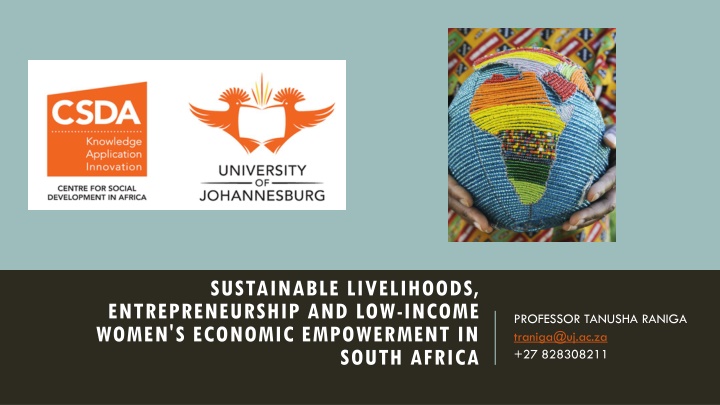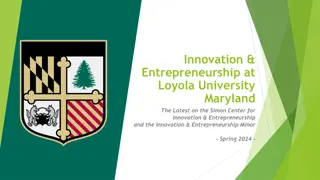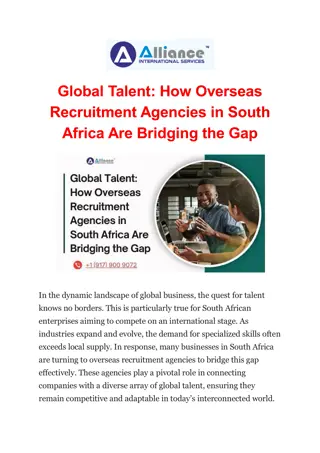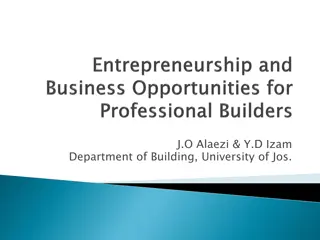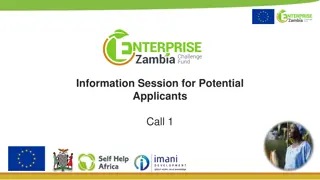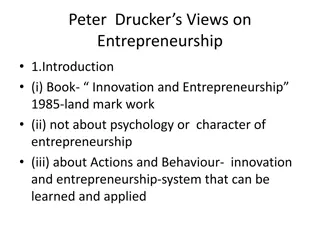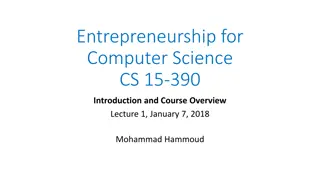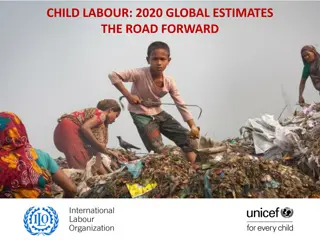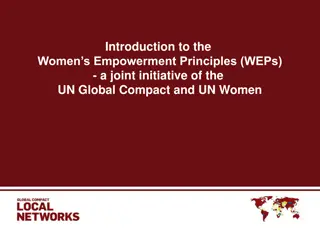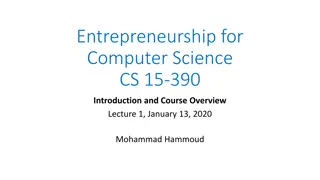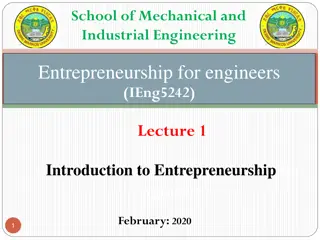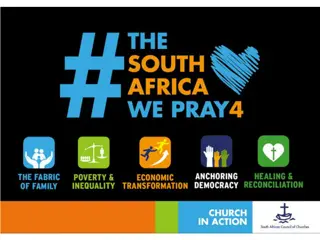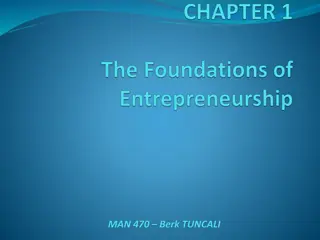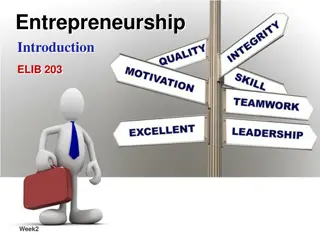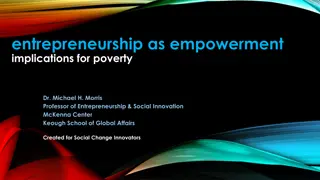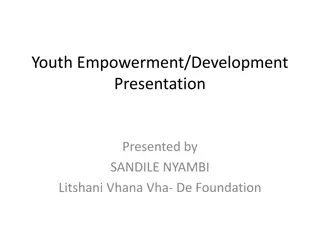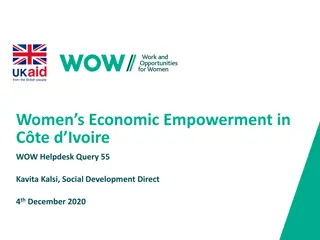Sustainable Livelihoods, Entrepreneurship, and Economic Empowerment in South Africa
The current state of South Africa reflects a transition to democracy accompanied by persistent challenges of poverty, unemployment, and inequality. Professor Tanusha Raniga focuses on sustainable livelihoods, entrepreneurship, and empowering low-income women through economic initiatives. The 2030 Agenda for sustainable development presents opportunities for redefining roles in social work, aligning with the SDGs and addressing interconnected issues such as poverty alleviation, gender equality, and environmental sustainability.
Download Presentation

Please find below an Image/Link to download the presentation.
The content on the website is provided AS IS for your information and personal use only. It may not be sold, licensed, or shared on other websites without obtaining consent from the author.If you encounter any issues during the download, it is possible that the publisher has removed the file from their server.
You are allowed to download the files provided on this website for personal or commercial use, subject to the condition that they are used lawfully. All files are the property of their respective owners.
The content on the website is provided AS IS for your information and personal use only. It may not be sold, licensed, or shared on other websites without obtaining consent from the author.
E N D
Presentation Transcript
SUSTAINABLE LIVELIHOODS, ENTREPRENEURSHIP AND LOW-INCOME WOMEN'S ECONOMIC EMPOWERMENT IN PROFESSOR TANUSHA RANIGA traniga@uj.ac.za +27 828308211 SOUTH AFRICA
SOUTH AFRICA IN CONTEMPORARY TIMES The current population of South Africa is 61 million and on 27 April 2024 we celebrate 30 years of democracy. Following the first democratic elections in 1994, South Africa experienced a shift from apartheid to a democratic, egalitarian society, a shift which took place in the context of neoliberal economic globalisation. Among the structural injustices inherited from the apartheid system, poverty, unemployment and inequality is prominent. The existence of a socially conscious government in South Africa has firmly placed poverty alleviation strategies high on the nation s agenda.
URBAN CONTRASTS WEALTH AND POVERTY Johannesburg: Sandton alongside Alexandra 3
TRANSFORMING OUR WORLD The 2030 Agenda for sustainable development provides social workers with an opportunity to redefine our roles and ethical responsibilities pertaining to human rights, gender justice, economic equality and environmental sustainability. The 17 SDGs include: no poverty, zero hunger, good health & well- being, quality education, gender equality, clean water & sanitation, affordable and clean energy, decent work and economic growth, industry, innovation & infrastructure, reducedinequalities, sustainable cities & communities, responsible production & consumption, climate action, life below water, life on land, peace, justice and strong institutions, partnership for the goals. 7
SDGS AND SOCIAL WORK 8 The values of social work and the SDGs are closely connected and have relevance for the application to practice. We also witness that the 17 SDGs are interconnected and the challenge for social workers lies in translating human rights and environmental concerns while confronting macro-economic policies that are viewed as ideologically and politically sensitive. Nevertheless, the SDGs and Global Agenda for social work and social development provide social workers a comprehensive and holistice intervention framework for practice. 4/17/2024
WOMEN AND POVERTY Feminization of poverty is a critical global social policy issue that social workers need to pay attention to. With the COVID-19 health crisis, in sub-Saharan Africa and South Asia, women have been more severely affected in the formal work sector and many have lost their jobs (Reichelt, Makovi & Sargsyan, 2021; Raniga, 2021). women experience poverty differently due to the systematic discrimination they continue to face, and which affects access to gainful employment in both the formal and informal economy (Briggs & Weathers, 2016).
POST-APARTHEID SOUTH AFRICA South Africa s history and current poverty status are grounded in colonial and apartheid legislation, entrenched racial discrimination around access to formal and informal employment and systematic disenfranchisement. Raniga (2016) argues that national poverty reduction strategies are linked weakly to strategies for economic growth and stability. Failure to consider gender as closely aligned to South Africa s macroeconomic neoliberal capitalism. strategy underscored by
WOMEN AND THE ECONOMY Women constitute the majority of the South African population but account for only a third of the labour force and have minimal representation on top management positions, as gender equality within the workplace is underpinned by occupational segregation (Raniga, 2021). The social and gender discrimination consciously instigated by management in the formal work sector, persistently create barriers to women s employment, growth and upward mobility. Evidently, women are still under-utilized in the South African employment market and the majority are employed in the poorest paid sector of the formal economy, namely the social services or public sector (Parry & Segalo, 2017; Raniga, 2021).
AFRICAN FEMINISM Historically in many societies across both Global South countries, gender relations and stereotypes have been deeply entrenched in our psyche and connected to the reproductive functions of women and the discourse that motherhood is self-sacrificing. This social construction of gender along with culturally induced nurturing and caring functions of women have instilled systemic and institutionalized patterns of self-denial and economic dependence of women (Nnaemeka, 2005, Raniga, 2019). Gender discrimination inevitably leads to the unequal sharing of resources such as information, time, access to family wealth, education and income management and distribution (Hendrickse, 2012).
THE STUDY PURPOSE A sense of urgency exists to reinvigorate developmental social work interventions to address income insecurity and dire poverty in female- headed households. In South Africa, non-governmental organizations are partnering with the Ministry of Social Development to train women who rely on monthly cash from the state to help enhance entrepreneurial skills and to start their own businesses. Informed by sustainable livelihood frameworks, this presentation provides some insight into the experiences of 20 women who participated in business development training facilitated by an NGO. and social development
CONTEXT OF STUDY: THE CLOTHING BANK The Clothing Bank (TCB) is an NGO that was established in 2010 in Cape Town to empower unemployed women to become confident, competent and independent entrepreneurs. The Clothing Bank was started by two retired women who had worked in multinational companies in the private sector. These project coordinators had a deep sense of social responsibility and they wanted to share their business skills with unemployed women who resided in impoverished communities. The project coordinators across the KZN, Gauteng, Western Cape and East London provinces have trained over 4000 unemployed women between the ages of 18-55 years since 2019.
Qualitative, descriptive design afforded the women the opportunity to speak with confidence about their psychosocial and economic experiences taking into account discrimination facing these women. Non-probability purposive sampling was used to select the women. The following criteria guided the selection of the women: Women who had participated in the NGO for the past two years; the intersectional QUALITATIVE METHODOLOGY Women who had completed the training at TCB Women communities in Gauteng who resided in low income
ETHICAL CONSIDERATIONS No harm to the participants, assurance of confidentiality and anonymity when reporting the findings, participants not having unrealistic expectations of the study, voluntary and written informed consent. Ethical clearance was obtained from the Research Ethics Committee of one higher education institution to conduct this study in 2019. Since this study presents the findings from a small sample of 20 women, the findings cannot be generalised. However, constant member-checks and keeping detailed field notes peer review meetings between the researcher and postgraduate students, served to enhance the truth value and trustworthiness of the findings (Marlow, 2011).
MOTIVATIONAL FACTORS PROMOTING WOMEN ENTREPRENEURS The women spoke about the desire for independence, self-fulfillment, wealth creation, social status and power, desire for a flexible lifestyle and enhancing their creative entrepreneurial skills Thesecond motivation shared by the women related to insufficient family income, dissatisfaction with a salaried job, difficulty in finding work in the formal work sector, desire for flexible work schedules and perceived lack of opportunity for career advancement
VOICES OF THE WOMEN Angeline: Being involved in the NGO gave me the opportunity to grow and spread my wings. Lillian: I never dreamt that I would be running my own business. Now I am able to employ two women. Martha: For the first time in my life I am working for myself and making my own money. Nkensani: The best part is helping other poor women to also succeed like me.
FINANCIAL CAPITAL CHALLENGES A lack of access to funding or cash to sustain their entrepreneurial activities. Thembeni commented : it was difficult for me during the training as I needed to pay someone to take care of my child yet I was not earning any money . The sustainability of entrepreneurial activities depends on access to credit and funding from government and private sector institutions who are primarily responsible for promoting women economic development (Raniga and Ngcobo, 2014). If we had access to government or private funding, we would be able to help more unemployed women and assist them to start their own businesses.
COPING STRATEGIES OF WOMEN The majority of the women expressed liberation with the evolution of gender roles perceived in contemporary South Africa. Fifteen of the twenty women stated that they had seen changes in the occupation roles pertaining to women in the informal economy. They expressed that opportunities for women to pursue social entrepreneurial activities in the informal economy had grown in the past decade which they perceived as essential for poverty eradication. Statistics South Africa (2020) confirms that more that 60% of the informal economy comprises women-led trading activities.
VOICES OF THE WOMEN I am a responsible woman; unlike men I don t run away from my responsibility. P6: Conquering mother, because I am not employed but I am able to conquer all the hardships and provide for my children and make sure at least they don t sleep in an empty stomach. P8: I am a proudly single mother, I no longer need a man in my life, and I m fine living with my children alone.
CONCLUSIONS The Clothing Bank s training provides evidence of an innovative case where Social work and Entrepreneurial research confirm the need to commit to enhance the innate capabilities of unemployed women and to contribute to goal 1 of the SDGs. Evidently, the experiences of the women highlights that social workers need to establish business forums to enable women entrepreneurs to build partnerships using social media platforms. The findings reveal that access to financial capital remains a dire challenge for women entrepreneurs as a result of poor funding from the private sector and government intervention.
RECOMMENDATIONS Social workers need to take cognizance of sustainable livelihood and developmental social welfare practices which advocates for gender justice in the home and informal economy. It is important to establish online business networking forums to support business training and women s roles as entrepreneurs. It is imperative that policymakers, social workers and gender activists lobby for access to microcredit and loans for women who engage in work in the informal economy.
RECOMMENDATIONS The valuable role that women play in the informal economy must be acknowledged by policy makers so that women can actively participate at higher levels of entrepreneurship. Government should develop a database for women in the informal economy so that targeted resource and policy support can be achieved Consistent business training programmes are necessary to equip women with marketing, financial literacy and budgeting skills to sustain their business activities beyond the informal economy. Social entrepreneurial activities should be encouraged by social workers as an innovative developmental social welfare intervention and for dealing with the feminization of poverty.
THANK YOU PROFESSOR TANUSHA RANIGA
